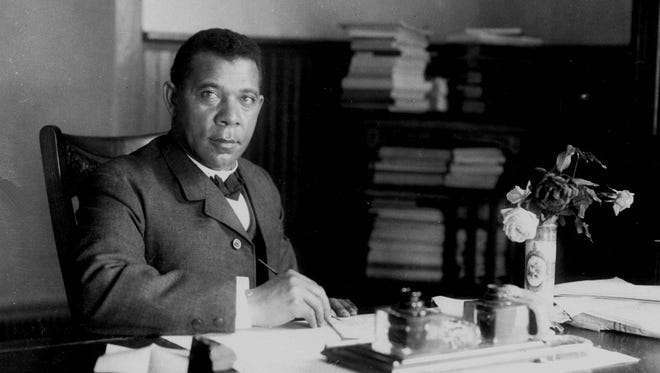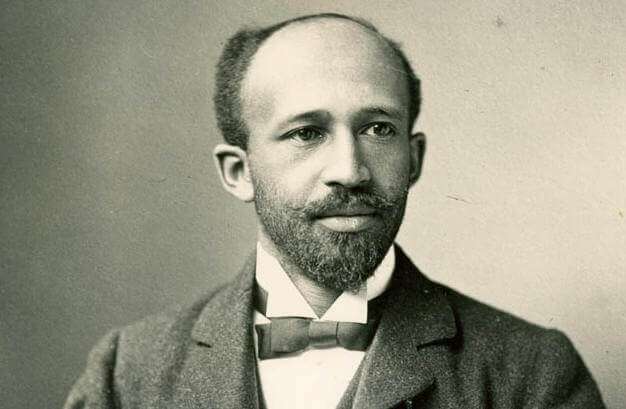The Debate Between Booker T Washington and Web Dubois Was Centered on Art
Booker T Washington vs W.E.B Du Bois took place before Martin vs Malcom.
But what was the great argue that shaped the course of the civil rights motility? And was this a real rivalry or more than of a disagreement on how to fight racism in America?
Both Booker T Washington and Due west.E.B Du Bois are extraordinary figures in American history. Each men had profound influence in the early 1900s in the struggle for Black equality, an influence that left an touch that can nevertheless be seen and felt.
The great Booker T Washington vs W.Eastward.B Du Bois debate was over which road would lead to equality: economic independence or fighting for civil rights. Washington believed Blacks having economic independence and creating wealth for themselves would atomic number 82 to equality while Du Bois argued that fighting for civil rights was the right course to take.
Born a Slave, Washington Becomes Blackness Elite
Booker T. Washington was born on April 5, 1856 into slavery in Virginia. After his mother, Jane (an African American woman), was emancipated, she moved the family to West Virginia. Washington's begetter was white, and he never knew the identity of his male parent. Young Washington went on to attend Hampton Normal and Agricultural Institute (now Hampton University) and Wayland Seminary (now Virginia Union University).

In 1881, Booker T. Washington became the showtime leader of the Tuskegee Institute in Alabama, a new organization founded for the college education of Blacks. He expanded the school by having the students work at the college constructing buildings and maintaining a large farm.
RELATED: Last Slave Send, Clotilda, and the Story of the Last Survivor Slave
Washington became a pop figure in the Blackness community and with liberal Whites beyond the country.
Even though he was criticized for non supporting civil right causes and having a softer tone when information technology comes to dealing with racism, Washington secretly funded litigation for civil rights cases, challenging laws that injure Blacks across the South.
Booker T. Washington also used his connections with rich white philanthropists to fund other schools he was developing besides Tuskegee. The likes of J.P. Morgan, Collis P. Huntington, and John D. Rockefeller contributed to Washington's crusade. He encouraged Black youths to learn skills that would make them cracking participants in the industrial revolution, and hence making them valuable members of guild.
In 1901, President Theodore Roosevelt invited Booker T. Washington to dine with him and his family at the White House. This was the first time a Black leader was officially invited to the white house and garnered high publicity equally a social occasion.
By the fourth dimension of his death in 1915, Washington had written 14 books, including his popular autobiography, Up from Slavery.

West.E.B. Du Bois Had A Different Perspective
William Edward Burghardt Du Bois was born on February 23, 1868 in Great Barrington, Massachusetts. Du Bois' parents, mother Mary Silvina Du Bois and father Alfred Du Bois, separated when he was only ii and Du Bois was raised with his mother'due south family.
Living in a bulk white neighborhood and attending a white school, Du Bois encountered racism. However, his brilliant heed was recognized and encouraged equally a child. After high schoolhouse, when DuBois decided to go to college, the First Congregational Church of Corking Barrington raised the money for his tuition.

Du Bois attended Fisk Academy (a historically black college in Nashville, Tennessee) and Harvard College. He went to Deutschland to attend the University of Berlin for graduate work. Du Bois returned home to nourish Harvard University and became the starting time African American to earn a Ph.D. from there.
RELATED: On Julian Bail & His Timeless Quotes on Civil Rights
In 1900, Du Bois attended the First Pan-African Briefing held in London.
He drafted a alphabetic character titled "Accost to the Nations of the World", a letter that called for world leaders to fight racism, grant colonies in Africa and the West Indies their independence, and demand political rights for African Americans.
In 1903, Du Bois published The Souls of Blackness Folk, a collection of fourteen essays the depicted Black life at the turn of the century. The book is believed to be one of the virtually influential social books of the century.
Afterwards the creation of the NAACP in 1910, Du Bois was given the position of Director of Publicity and Research. His main task was editing the NAACP'due south monthly magazine, which he named The Crisis. The magazine was a major success and the circulation reached 100,000 in 1920.
When the Harlem Renaissance took identify in the mid-1920s, Du Bois promoted African American artistic creativity in his writings, such as his article "A Negro Art Renaissance." Dr. Du Bois was too an outspoken Socialist and ran for the U.S. Senate on the American Labor Political party in 1950, at the age of 82.
Among other things, Du Bois was a sociologist, historian, civil rights activist, Pan-Africanist, and author. He died in Accra, Ghana in 1963, one twelvemonth before The Civil Rights Act of 1964, the act that embodied many of the reforms Du Bois fight for all his life.
Booker T Washington vs Due west.E.B Du Bois
Both Booker T. Washington and Westward.Eastward.B. Du Bois had the goal of liberating the Black race from inequality and hardship. How can this exist accomplished best? Is it through Blacks concentrating their efforts on piece of work, building businesses, and creating wealth for themselves and their communities or through putting their efforts to fight the arrangement for equal citizen rights?
In the decades since his passing, Booker T. Washington has been greatly criticized for his "accommodating" approach when it comes to fighting racism. He believed if a race war was to break out, Blacks, who were severely outnumbered, would exist demolished. Then, in order to avert a harsh conflict that could destroy communities, he believed Blacks should accept a cautious approach when fighting for civil rights.
Washington believed the offset step towards complete equality for blacks was a footstep towards financial independence.
RELATED: The Silent Parade of 1917: Why the Forgotten March Matters
In 1895, Booker T. Washington gave a spoken language at a Cotton State and international Exposition in Atlanta. In the speech, Washington emphasized that Blacks should set aside their demands for civil rights for now and instead concentrate on building strong communities through commerce.
Washington said: "Ignorant and inexperienced, it is not foreign that in the starting time years of our new life nosotros began at the top instead of at the bottom; that a seat in Congress or the state legislature was more sought than real estate or industrial skill; that the political conversation or stump speaking had more attractions than starting a dairy farm or truck garden."
Washington basically wanted blacks to be left solitary in their communities, fifty-fifty if segregated, to subcontract their lands, own their lands, and build their own communities. He told whites, it'southward ok, we won't bother you about civil rights, and you don't carp us.
The speech was generally accepted well at the fourth dimension by Blacks in the South. They viewed information technology as a practical fashion for Blacks and Whites to co-be.
Westward.E.B. Du Bois outset supported Washington'south spoken communication just subsequently became one of his harshest critics.
In one of his essays, titled "Of Mr. Booker T. Washington and Others", Du Bois had this to say: "Mr. Washington came, with a single definite programme, at the psychological moment when the nation was a lilliputian ashamed of having bestowed so much sentiment of Negroes, and was concentrating its energies on Dollars. His programme of industrial education, conciliation of the S, and submission and silence as to civil and political rights, was not wholly original…But Mr. Washington first dissolubly linked these things; he put enthusiasm, unlimited free energy, and perfect faith into this programme, and changed it from a by-path into a veritable Way of Life. And the tale of the methods by which he did this is a fascinating study of human life."
Subsequently Washington's passing, Du Bois became the leading blackness intellectual and brought his ideas to the forefront of the civil rights movement. He believed putting all efforts into edifice wealth without having civil rights guaranteed to Blacks was a dangerous approach.
Du Bois was non alone in assertive this. Booker T. Washington was viewed as a sell out for decades until a re-examination of his life and teachings lead many to believe that he had a reasonable approach for the way things were at the time.
Washington'due south push for putting almost all efforts into building strong Blackness communities away from white communities is an idea a lot of Black leaders view as smart now. His push for Black buying is the basis for many successful blackness businesses that kept many communities afloat in the South.
Of course, it is piece of cake to see where Du Bois' influence has atomic number 82. The Civil Rights Move was congenital on the dorsum of teachings and ideas spread by the likes of W.E.B Du Bois.
What is your opinion on the affair? Let united states of america know below in the comments.
castellanoforeplarks.blogspot.com
Source: https://www.blackexcellence.com/booker-t-washington-vs-web-dubois/
0 Response to "The Debate Between Booker T Washington and Web Dubois Was Centered on Art"
Post a Comment